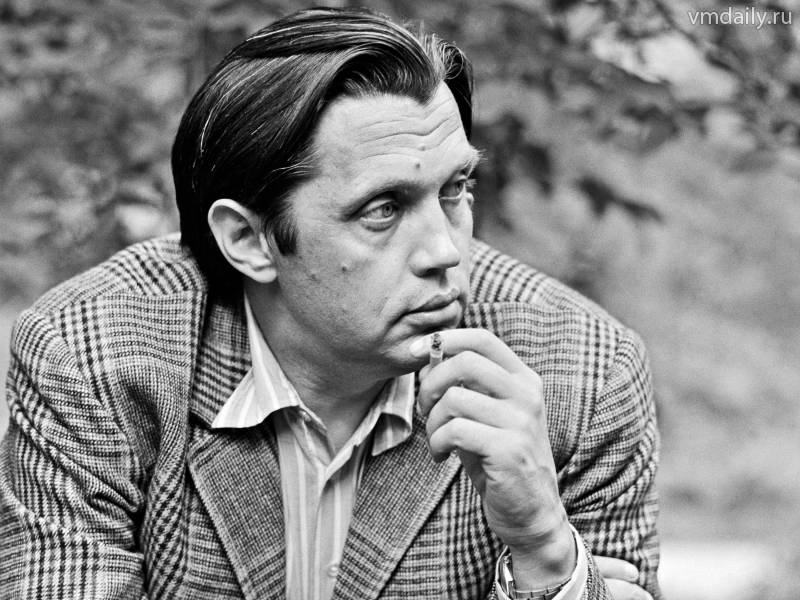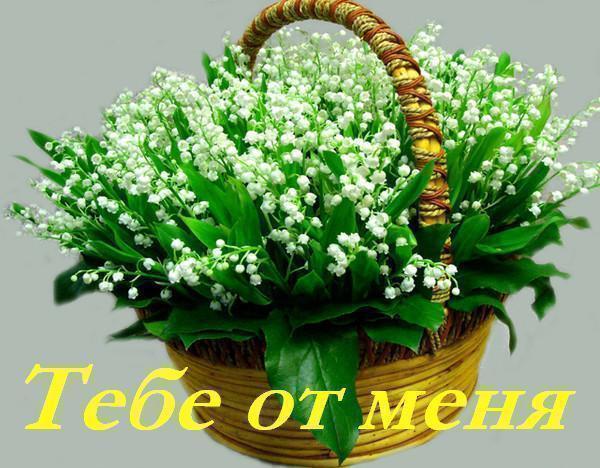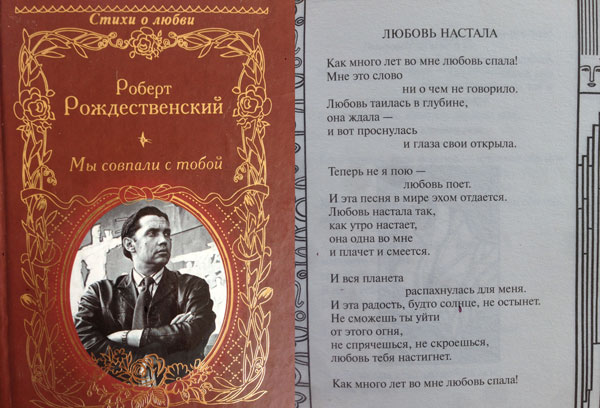The song under the microscope today is called Любовь настала – Love has come. The lyrics are by Роберт Рождественский. You can read an article about him here.

As I have said in previous articles, the key to learning Russian or any language is “to learn it in context”. What context? Films, songs, poems, interviews, radio, tv shows, books, cartoons, theatre etc.
Another key is to learn vocabulary through associations.
Do you come across a new word for the first time? Before you rush to open up Google Translate look at it for a second.
Can you guess its meaning?
Have you seen any similar words?
Can you find any word roots hidden in it? (Read this).
Rack your brains to make an association with something you already know.
Don’t learn vocabulary! Examine vocabulary! Link vocabulary! Interrogate vocabulary!
This process is not a waste of time. It’s the only way to make strong memories in your head.
Любовь настала – The Song
I only recently found out that music has been composed for this poem by Рождественский. You can listen to the song below:
Любовь настала – The Poem
You may also want to hear someone (a beautiful lady) read the poem below. Listen a couple of times. Then read the poem yourself. Listen again. Read again. Go through the “Anatomy” section below. Listen again. Read again. This is real Russian language practice in context. 🙂
Любовь настала – The Lyrics
Как много лет во мне любовь спала.
Мне это слово ни о чём не говорило.
Любовь таилась в глубине, она ждала –
И вот проснулась и глаза свои открыла!
Теперь пою не я – любовь поёт!
И эта песня в мире эхом отдаётся.
Любовь настала так, как утро настаёт.
Она одна во мне и плачет и смеётся!
И вся планета распахнулась для меня!
И эта радость, будто солнце, не остынет!
Не сможешь ты уйти от этого огня!
Не спрячешься, не скроешься –
Любовь тебя настигнет!
Как много лет во мне любовь спала.
Мне это слово ни о чём не говорило.
Любовь таилась в глубине, она ждала –
И вот проснулась и глаза свои открыла!
Любовь настала – The Anatomy
Как много лет во мне любовь спала. – How many years love was sleeping inside me!
Nothing special here guys. Same structure as in English:
Как много лет! – How many years!
Как много сахара! – How much sugar!
Well, nearly the same… We have a genitive case here after много.
Много + Genitive Case - Очень
Много means many/much/lots of and takes genitive case. For example:
много сахара (genitive of сахар – sugar) – much sugar
много людей (genitive of люди – people) – many people
много книг (genitive of книги – books) – many books
As you see, there is no distinction between many and much in Russian!
Много can also be used as a simple adverb. For example:
Оксана много работает – Oksana works a lot.
What’s the difference with очень? Очень means very and accompanies an adjective or adverb. For example:
Ты играешь на гитаре очень хорошо. – You play the guitar very well.
Очень много людей в театре. – There are too many people in the theatre.
Ты очень интересный человек – You are a very interesting person.
Remember now:
один год – 1 year
два года – 2 years
три года – 3 years
четыре года – 4 years
пять лет – 5 years
много лет – lots of years
двадцать лет – 20 years
With big numbers, the far right digit (least significant) will determine the form. For example:
сто шесть лет – 106 years
двадцать один год – 21 years
Сколько тебе лет? – How old are you?
Мне двадцать восемь лет – I’m 28.
во мне – “in me” (inside me) prepositional case
Here в becomes во to make things sound better. Just like ко мне (read previous article here)
мир во всем мире – peace in the whole world (Remember мир can be either peace or world.)
война и мир – war and peace (famous work of Толстой)
любовь спала – love was sleeping
спать – to sleep
я сплю – I sleep
Я сейчас сплю. – I’m sleeping now.
Любовь is a feminine noun, that’s why we use the past form спала. For masculine nouns, we use the form спал:
Папа спал хорошо вчера. – Dad slept well yesterday.
Tip: As with all the nouns ending in a soft sign -ь associate an adjective with them to remember their gender (Read article here):
сильная любовь – strong love
This phrase reminds us of the beautiful song by Звери – Просто такая сильная любовь. Listen here.
Мне это слово ни о чем не говорило
Reordering:
Это слово [subject] мне [indirect object] не говорило ни о чем [direct object] – This word to me didn’t say (didn’t mean) anything.
Why это?
Because это refers to слово (neuter noun ending in -о).
этот дом – this house (этот for masculine nouns)
Дом ending in a consonant (-м) is a masculine noun.
эта любовь – this love (эта for feminine nouns)
Why говорило?
Because говорило refers to слово.
слово → ends in -o → neuter noun → what’s the past form of говорить for neuter nouns? → говорило.
говорить – to say
я говорю – I say
Past form: говорил (masculine) – говорила (feminine) – говорило (neuter)
ни о чем – nothing
разговор ни о чем – conversation about nothing (useless, pointless conversation)
Attention: The prepositional case and dative case of Я is the same – Мне!
во мне – prepositional case
мне говорило – dative case
думай обо мне – prepositional case (think about me)
говорить кому-то что-то – tell somebody something
Я говорю тебе правду. – I’m telling you (indirect object, dative case) the truth (direct object, accusative case).
любовь таи́лась – love was hiding
таиться – to hide
таиться is a reflexive verb (love hid “itself”)
таился – masculine таилась – feminine таилось – neuter
There is also an active verb таи́ть – to hide something
таить секрет – hide, conceal a secret
So love was hiding… Where??
Get ready for a prepositional case to explain where the love was hiding…
в глубине – in the deepness, bottom
глубина – bottom, depth
Prepositional Case - Feminine Nouns ending in -a
Feminine nouns ending in -а turn -a into an -е in the prepositional case. For example:
глубина → в глубине
школа → в школе
она ждала – she was waiting
ждать – to wait
Я жду тебя. – I’m waiting for you.
любовь ждала – love was waiting
любовь спала – love was sleeping
любовь открыла – love opened
любовь таилась – love was hiding
любовь проснулась – love woke up
Wrong form IDи вот проснулась – and here it woke up (here it comes!)
проснуться – to wake up
Сергей только что проснулся. – Sergei just woke up.
Мария только что проснулась. – Maria just woke up.
проснуться (perfective verb) – it’s similar to вернуться – to come back/return
Я проснусь – I’ll wake up
Я вернусь – I’ll return
проснуться – perfective, to become awake whereas просыпаться – imperfective, to wake up (as a process).
вот – here it is, here you are
– Где твоя книга? – Where is your book?
– Вот моя книга! – Here is my book!
Вот он пришел! – Here he is! (he just appeared)
Вот она! – Here she is!
и глаза свои открыла (любовь) – and love opened its eyes
открыть – open (perfective)
я откро́ю – I’ll open
Открой дверь! – Open the door!
открывать (imperfective)
я открываю – I open
теперь пою не я – now (it’s not me singing)
я пою – I sing (I’m singing)
петь – to sing
певец – singer певица – (female) singer
любовь поёт – love is singing
Люди поют. – People are singing.
И эта песня в мире эхом отдается – and this song is echoed in the world
отдаться – to give myself (also surrender).
Associations
Отдаться is the perfective verb.
What is the main verb – ingredient of отдаться?
Correct. дать – to give
Я дам. – I’ll give. (ты дашь – он даст – мы дадим – вы дадите – они дадут)
Why “Я дам” translates to “I will give”?
Because дать is a perfective verb and all perfective verbs talk about an action which will be completed in the future.
You say to your Russian friends: “Я вернусь в Россию – I will come back to Russia”.
Remember earlier we said that вернуться – to come back (Я вернусь) is an imperfective verb.
The perfective verbs don’t have a Present Form.
Have a look at the conjugation of the verb дать on Wiktionary. No Present Form, you see? Blank!
If you check other perfective verbs on Wiktionary you’ll see none of them has a Future form. Check for example вернуться.
What is the imperfective of дать? давать – to give (я даю – ты даёшь – он даёт – мы даём – вы даёте – они дают)
Why do we have that -ся in the end of Отдаться?
Correct. Отдаться is a reflexive verb. I surrender myself. I give myself.
Just like вернуться. I come back myself. I return (myself). I don’t return anything (an object) to anyone else. For example: вернуть деньги – return/give back money. You see there is no –ся here.
Why do we have that от- in the beginning of Отдаться?
The simple form (non-reflexive) of отдаться is отдать – to give away. You can visualise that you give something away to someone. It goes to them from you (от тебя – from you).
You give some flowers to a girl: Эти цветы тебе от меня – These flowers to you from me.

Can you guess now the imperfective of отдаться?
дать (perfective) → давать (imperfective) So…
отдаться (perfective) → отдаваться (imperfective)
One last association. Дария (Даша) is a beautiful Russian name (OK, that’s a personal opinion here!) . Although the origin of this name is Persian you could also associate it with дать – give. Give what? A present. A child that comes to the world is like a present from God, подарок – present.
подарить – give a present
Remember in a previous article we saw the phrase: Я хотел бы подарить тебе песню – I’d like to dedicate/give a song to you from a famous song by А. Розенбаум.
Just like…
в ресторане – in the restaurant (prepositional case) ресторан – restaurant
эта песня (песня is feminine hence we use эта)
эта школа – this school
эта любовь – this love
эхом –( instrumental case) эхо – echo
Instrumental Case
The instrumental case denotes the medium through which – how something is done. Here, the song is transmitted/spreaded to the world through an echo.
писать ручкой – to write with a pen (ручка – pen)
Я сам построил дом своими руками – I built the house with my own hands.
Любовь наста́ла так, как утро настает. – Love came as downing comes (comparison).
Год прошел не так, как мы ожидали. – The year passed not as expected.
пройти – pass
A useful phrase: Как твой день прошел? – How was your day?
Все не будет так, как хочется. – Not everything will be as you wish (it to be).
настать – to come
любовь настала – love came
утро настало – morning came
Она одна во мне и плачет, и смеётся. – (Love) inside me, cries and smiles.
I have no control over my love inside me. She does whatever she wants.
я один – I’m alone (on my own)
один – masculine
любовь одна
одна – feminine
одно облако
одно – neuter
óблако – cloud
плáкать – to cry ≠ смеяться – to laugh
я пла́чу – I cry ≠ я смеюсь – I laugh
Чего ты смеёшься? – Why are you laughing?
Be careful with the stress here. Я плачу́ means I pay from the verb плати’ть – to pay.
Wrong form IDВся планета распахнулась для меня. – The whole planet opened (all its doors wide open!) for me.
распахнуться – to open (oneself) wide
Associations
распахнуться – to open (oneself) wide
вернуться – to come back
проснуться – to wake up
для меня – for me
для тебя – for you
Remember we saw earlier эти цвети тебе? You can also say эти цвети для тебя – These flowers are for you.
для + genitive case
для тебя – тебя genitive case of ты.
Эта радость – What is the gender of радость?
You can tell it from эта → feminine
я рад – I’m glad
Я рад, что тебе понравилась моя песня “Любовь спала”. – I’m glad you liked my song “Love was sleeping”.
Эта радость, будто солнце, не остынет. – This happiness, as if it was a sun, will not cooling down.
остыть – to cool down осты́ну (perfective verb)
In other words, “this happiness – joy will keep hot blazing like the sun”.
Не сможешь ты уйти от этого огня. – You will not be able to escape from this fire.
смочь – perfective of мочь – to be able to
не смогу – I won’t be able, I can’t manage
этот огонь – fire, flame
genitive → этого огня
уйти откуда? – Escape from where?
от огня – from the fire
от меня – from me
от любви – from love
All the above in genitive case.
Here we have another meaning of от меня – from me (To go away from me).
не спрячешься – you won’t hide (perfective)
All the verbs in the last verse are perfective. They follow the same structure.
спрятаться – to hide oneself
не скроешься – again you won’t hide (perfective) я скроюсь
For emphasis, two verbs with the same meaning are used here.
настичь – to overtake
Любовь тебя настигнет. – Love will overtake you (get you).
настичь is perfective and настигать is imperfective.
Лев настигает добычу – The lion is catching the prey.
Чувствую, что судьба меня настигает – I feel that my destiny is catching up with me.
PS: I would like to thank my friend Alena Kovina for introducing me to Рождественский and giving me a small book with his poems about a year ago in Moscow. Thanks Alena!


Thank you very much for such a wonderful LESSON !!🎶🌷🎼
Thank you very much for choosing such a your wonderfull song, and for your LESSON !!
🎶🌷☀️🎆
You are very welcome Maria! More are coming soon… 🙂
Very good as always!!!!